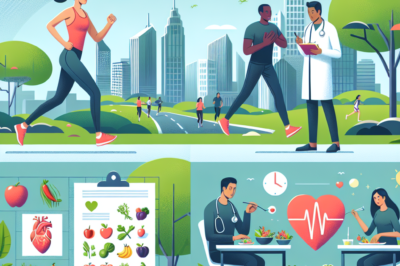
When it comes to your heart, taking proactive steps to protect it isn’t just a good idea—it’s essential. Heart disease remains one of the leading causes of death worldwide, but with the right knowledge and actions, it’s also one of the most preventable. As we dive into the role cardiologists play in preventing heart disease, remember that these strategies are not just for those with existing heart conditions; they’re for everyone looking to maintain or improve their heart health.
Key Takeaways
- Understanding your personal risk factors for heart disease is the first step in prevention.
- Adopting heart-healthy habits like a balanced diet and regular exercise is crucial.
- Cardiologists use a variety of tools to help manage and reduce your risk of heart disease.
- Educational empowerment by cardiologists is key to patient self-care and prevention.
- Regular check-ups and collaborative care can help catch early signs of heart disease.

Prevention is the Key: Your Cardiologist’s Game Plan
Most importantly, prevention begins with a solid game plan. Your cardiologist’s role is to help you understand your heart health and develop a strategy tailored to your unique needs. This might include lifestyle changes, medications, or even certain medical procedures, depending on what your heart requires.
Understanding Your Heart Health
Before we can make any game-changing moves, we need to get the lay of the land. This means understanding the health of your heart. A cardiologist will often start with a thorough evaluation of your heart’s condition, including your family history, lifestyle, and any current symptoms you might have. This is because your past and present shape your heart’s future.
Strategies Your Cardiologist May Use
Once we’ve got a clear picture, it’s time to talk strategies. Your cardiologist may recommend a variety of approaches to keep your heart in top shape. These could range from dietary changes to prescribed exercise routines, and in some cases, medication to manage conditions like high blood pressure or cholesterol.
Assessing Your Risk: The First Crucial Step
Why is risk assessment so crucial? Because knowing what you’re up against can make all the difference. It’s like having a map in unfamiliar territory. With it, you’re much better equipped to navigate your way to safety.
Why Knowing Your Risk Factors Matters
There are certain factors that can increase your risk of heart disease, such as high blood pressure, smoking, and a family history of heart problems. Knowing these risks can help you and your cardiologist create a prevention plan that’s just right for you.
How Cardiologists Evaluate Your Heart Disease Risks
Your cardiologist will take a detailed medical history, conduct a physical examination, and may order tests like blood work or an ECG. They’re like detectives, piecing together clues to form a complete picture of your heart health.
Healthy Habits: Your Heart’s Best Friends
Once risks are identified, it’s time to take action. And that action comes in the form of healthy habits. Think of these habits as your heart’s best friends—they’re there to keep it happy and healthy.
Eating Well for a Strong Heart
A heart-healthy diet is rich in fruits, vegetables, whole grains, and lean proteins. It’s like fueling your car with the best gas. Good nutrition keeps your heart running smoothly and reduces the risk of heart disease.
Physical Activity: Every Beat Counts
And let’s not forget about exercise. Physical activity strengthens your heart just like it strengthens your muscles. The American Heart Association recommends at least 150 minutes of moderate-intensity aerobic activity per week. That’s just 30 minutes a day, five days a week—a small investment for a healthy heart.
But what happens when lifestyle changes aren’t enough? Sometimes, despite our best efforts with diet and exercise, we need an extra line of defense against heart disease. That’s where medical management comes into play.
Medical Management: Beyond Lifestyle Changes
It’s important to understand that while lifestyle changes are the cornerstone of preventing heart disease, some individuals may require additional interventions. This is where your cardiologist’s expertise is indispensable. They can guide you through the options that could be the most beneficial for your heart.
Medications as Preventive Tools
Medications can be powerful allies in the fight against heart disease. For instance, statins are commonly prescribed to lower cholesterol, while antihypertensives tackle high blood pressure. Your cardiologist will consider factors like your personal risk profile and the potential benefits and side effects of medications to find the right fit for you.
Interventional Procedures for Risk Management
For some, medications alone might not be enough. In these cases, interventional procedures such as angioplasty or stenting can be life-saving. These procedures can open up clogged arteries, ensuring that blood flows freely to the heart muscle, thus reducing the risk of a heart attack.
The Power of Knowledge: Education for Prevention
Education is a powerful tool in preventing heart disease. Understanding why certain lifestyle changes or medications are necessary helps patients to stick with their treatment plans. Your cardiologist doesn’t just prescribe medicine; they teach you how to take care of your heart.
Your Cardiologist’s Role as an Educator
As an educator, your cardiologist will provide you with the information you need to make informed decisions about your health. They’ll explain the ‘whys’ and ‘hows’ of heart disease prevention, equipping you with the knowledge to take charge of your heart health.
Empowerment Through Understanding
When you understand the workings of your heart and the impact of your lifestyle choices, you’re empowered to make changes that can have a lasting effect on your health. This empowerment is a critical part of prevention, and it’s something your cardiologist is passionate about providing.
Advanced Care Planning: Preparing for What’s Ahead
Preventing heart disease isn’t just about the here and now; it’s also about planning for the future. Advanced care planning involves making decisions about the care you would want to receive if you become unable to speak for yourself.
Monitoring for Early Signs of Heart Disease
Part of advanced care planning is monitoring for early signs of heart disease. Catching symptoms early can make all the difference in treatment and outcomes. Your cardiologist will use tools like echocardiograms and stress tests to keep a close watch on your heart’s health.
Regular Check-Ups and Their Importance
Regular check-ups are a key component of preventing heart disease. These visits allow your cardiologist to track your heart’s health over time and make adjustments to your care plan as needed. Think of them as regular tune-ups that keep your heart running smoothly.
Working with Other Healthcare Professionals
Besides your cardiologist, a team of healthcare professionals can play a role in preventing heart disease. This team might include a dietitian, a physical therapist, and perhaps a diabetes educator if you have blood sugar concerns. Each professional brings their expertise to the table, creating a comprehensive plan that covers all aspects of your heart health.
When to Seek a Second Opinion
If you’re facing a major decision about treating heart disease, or if you’re not confident in the treatment plan proposed, it’s wise to seek a second opinion. Another cardiologist can provide a fresh perspective and may suggest alternative treatment options. Remember, it’s your heart, and you have the right to explore all your options to ensure the best care.
Seeking a second opinion can also be reassuring. It can confirm that your current treatment plan is appropriate or provide new insights into different strategies that could be beneficial. It’s about getting the best possible care for your heart.

Frequently Asked Questions (FAQ)
When it comes to heart disease prevention, patients often have questions about how they can play an active role in their heart health. Let’s address some of the most common queries.
How can seeing a cardiologist prevent heart disease?
Seeing a cardiologist can significantly lower your risk of heart disease. They can identify risk factors you may not be aware of, prescribe treatments, and guide you on the path to a heart-healthy lifestyle. By catching potential issues early and managing them proactively, cardiologists are invaluable in the fight against heart disease.
What lifestyle changes can reduce my risk of heart disease?
Lifestyle changes are the bedrock of heart disease prevention. Here are some actionable steps you can take:
- Eat a balanced diet rich in fruits, vegetables, whole grains, and lean proteins.
- Engage in regular physical activity, aiming for at least 150 minutes of moderate exercise per week.
- Quit smoking and limit alcohol intake.
- Maintain a healthy weight to reduce strain on your heart.
- Manage stress through techniques like mindfulness, meditation, or yoga.
These changes can have a profound impact on your heart health and significantly reduce your risk of heart disease.
How often should I visit my cardiologist for heart disease prevention?
The frequency of visits to your cardiologist for heart disease prevention can vary based on your individual risk factors. However, a good rule of thumb is to have a check-up at least once a year. If you have existing heart conditions or multiple risk factors, your cardiologist may recommend more frequent visits.
Can heart disease be prevented with medications alone?
Medications are an important tool in preventing heart disease, but they’re most effective when combined with healthy lifestyle choices. While drugs can help manage risk factors like high blood pressure or cholesterol, they’re not a cure-all. A holistic approach that includes diet, exercise, and medication is the best defense against heart disease.
What are the signs that I should see a cardiologist for heart disease risk?
It’s time to see a cardiologist if you have any of these signs or risk factors:
- High blood pressure or cholesterol
- A family history of heart disease
- Diabetes or obesity
- Smoking
- A sedentary lifestyle
If you’re experiencing symptoms like chest pain, shortness of breath, or excessive fatigue, it’s crucial to see a cardiologist immediately as these could be signs of an existing heart condition.
Remember, your heart is the engine of your body, and taking care of it requires a combination of knowledge, action, and teamwork. With the right approach, you can significantly reduce your risk of heart disease and lead a long, healthy life. So take charge of your heart health today—your future self will thank you.






Leave a Reply